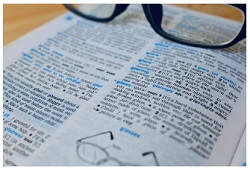このコンテンツでは look と see の違いをまとめています。
「見る意図があったかどうか」が違い、「事件などを目撃する」の動詞は一方だけを使います。
英語類義語活用辞典、英語類義語使い分け辞典、ロングマン英々辞典を参考にしています。
- PR:Amazon
- 英語類義語活用辞典
↑”試し読み”とKindle版あります - 英語類義語使い分け辞典
英語類義語使い分け辞典の解説
見る
look at
見ようとして視線を向ける。
see
積極的に見る意志がなくて自然に視覚に映る。(最も一般的な語。「見ようとして見る」の場合もある)
watch
動く(可能性のある)ものを注意を集中して見る。
behold
(古)特に珍しいものを見る。
observe
注意深く見る。
view
注意深く眺める。
ロングマン英々辞典の解説
look
1 to turn the eyes so as to see something or see in the stated direction
What are you looking at?
2 to use the eyes in order to find something; search
You could see it if you’d only look.
3 to seem by expression or appearance
You look tired.
4 to face in the stated direction
Our house looks east.
5 to have an appearance that matches
He’s beginning to look his age.
see
1 to use the eyes; have or use the power of sight
He doesn’t see very well with his right eye.
2 to get sight of; notice, examine, or recognize by looking
I looked for her, but I couldn’t see her.
3 to have experience of; UNDERGO
You and I have seen some good times together.
4 to understand or learn by looking, through experience, etc.; come to know
It took me a while to see the truth of her remarks.
5 to recognize the meaning, purpose, or importance of; understand
“Do you see what I mean?””Yes; now I see.”
英語類義語活用辞典の解説
look と see はどちらも「見る」ですが、あらかじめ見る意思があったかどうかの違いがあります。
look は「見る」意思を持っています。scrutinize(子細に眺める)に近い動作です。
I looked at it.はI took a look at it.と同じで、I took a close look.と大差ありません。

それではこの look を see に替えたらどうなるでしょうか?
もちろん I saw it.となり、言い換えるとI took notice of it. あるいはI took it in. になります。
look が初めから見るつもりがあるのに対し、see は何かを偶然目撃することです。
see は法廷用語の witness と同義です。
I saw him running on the deserted street on the night of murder.
(殺人があった夜、誰もいない真夜中の道をあの男が走っていくのを見ました)
上の例では、見ようと思って見たわけではないのでlookは使えません。
















